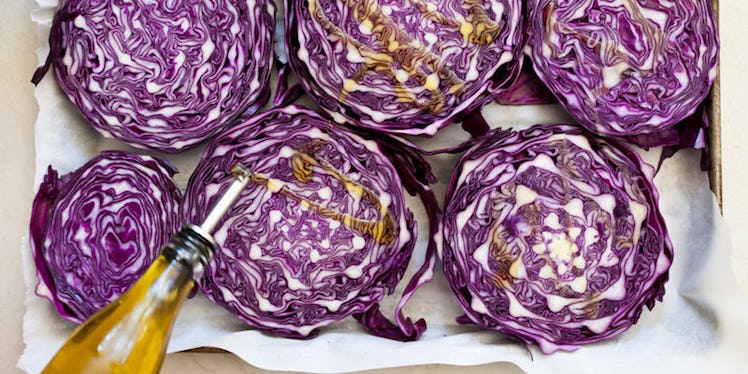
9 Cooking Oils You Should Incorporate Into Your Wellness Routine
When you cook at home, every ingredient counts. Everything you add to your dish should contribute something valuable, such as health benefits or flavor.
Oil is one of those ingredients that doesn't just have to be there to add moisture or consistency to your homemade dishes. Cooking oils can contribute valuable health benefits to all your recipes.
Different oils fulfill different needs for health, taste and cooking. One of the biggest benefits oil has is it adds fat to our diets. As experts report, fat is necessary to maintain whole health. For optimal health, our bodies need a variety of healthy fats found naturally in different oils.
Here are some cooking oil options, along with their benefits and suggested uses:
Olive Oil
Olive oil is a great source for monounsaturated fats, which are the good kinds of fats. This fat comes in different versions, including extra light, virgin and extra virgin. Use extra light for stir-frying and baking. Its subtle taste won't interfere with the other flavors in the recipe. It's also perfect for keeping minced garlic moist.
Use virgin olive oil for sautéing and grilling fish, vegetables or chicken. Use extra virgin when you want that olive flavor to really come out front and center. Extra virgin olive oil is ideal for salad dressings and dips like hummus.
Canola Oil
Canola oil is naturally low in saturated fat, so it's a good alternative for those who count calories. It's an all-purpose oil you can use for almost anything, including sautéing, baking (Baked fries, anyone?) and grilling.
Vegetable Oil
Vegetable oil is a hybrid of plant-based oils, so it can contain combinations of a lot of different oils, such as soybean oil, sunflower or safflower oil. As such, the nutrient value is going to vary greatly. Just check the labels to find a brand you're satisfied with.
Peanut Oil
Did you know peanut oil is the secret Southerners use to make crispy fried chicken? Its mild flavor and high smoke point make it ideal for deep frying.
If you're using peanut oil to fry up something, make sure you get the refined variety. It's got the highest smoke point of 450 degrees. Regular is at 440 degrees, and unrefined is the lowest at 350 degrees.
But the best thing about peanut oil is, it's 100 percent cholesterol-free. That's right, and it also has no trans fat whatsoever.
Grape Seed Oil
Grape seed oil is an excellent source of polyphenols. What's a polyphenol, you ask? A polyphenol is an antioxidant. It helps to control those aging free radicals that may be coursing through your body as we speak.
Grape seed oil has a subtle flavor that makes is perfect for dressings, dips, sautéing and baking.
Sunflower Oil
If peanut oil isn't available in your supermarket, you can substitute sunflower oil for your deep frying needs. You can even cut your pure butter with sunflower oil to make your own spreadable butter.
Just allow your butter to come to room temperature, add in a measure of sunflower oil to your preferred consistency and mix by hand or with a stand mixer until thoroughly blended.
Sunflower oil is an excellent source of linoleic acid, which helps with high blood pressure, heart disease and more.
Coconut Oil
Right now, a lot of people are realizing the benefits of coconut oil. But if you haven't heard, it's become a favorite for vegans and vegetarians who have discovered it's a fine replacement for butter in many recipes.
From curry sauce to cupcakes, coconut oil is a versatile option that won't let you down. Coconut oil's high levels of lauric acid translate to better heart health.
Sesame Oil
Sesame oil comes from sesame seeds, of course. And as such, it's available in dark and light varieties. Light sesame oil is pressed from raw sesame seeds, and dark comes from — you guessed it — toasted sesame seeds. The dark sesame oil imparts that rich, toasty flavor to your dish. If you'd rather the sesame oil take a back seat, use the light sesame oil.
Both light and dark sesame oils offer loads of antioxidants, which as we talked about earlier, help combat free radicals and aging. Light sesame oil is great for hummus, while dark sesame oil adds robust flavor to your stir-fry.
Avocado Oil
You probably already use avocados to make your guacamole, but avocado oil is also a tasty way to enhance your food while contributing nutrients to your diet.
Avocado oil can be used for sautéing, and for all your salad and pasta dressings. Use avocado oil whenever you want to add folate, Vitamin K and oleic acid to your health program.
As you can see, cooking oils don't have to play a passive role in your kitchen. When you use the right oils for the right dishes, you end up with maximum flavor and maximum health.
Sharon Chen is the author of DelishPlan.com, where she helps busy professionals plan easy and delicious meals in less time they ever thought possible. Save this Cooking Oils and Their Uses infographic for easy reference so you know exactly which oil to use for different cooking purposes.